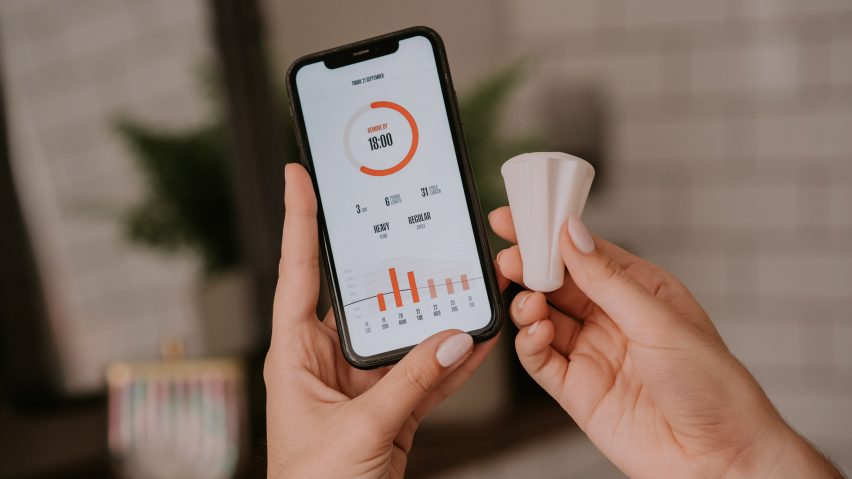Tech start-up Emm has unveiled its eponymous menstrual cup, which can be inserted like a tampon and is fitted with smart technology that tracks your period "without you having to do a thing".
Emm is a set of period products named after the female-founded, UK-based start-up.
The kit includes a neutrally-hued medical-grade silicone menstrual cup finished in a conical shape that is not dissimilar to a shuttlecock.
"Most menstrual cup designs claim to be one size fits all," said Emm founder Jenny Button.
"However, the O ring seal of a standard menstrual cup is a fixed diameter, resulting in leaking if a user doesn't fit the precise measures of that cup," she told Dezeen.
"The inspiration for the Emm design was inspired by stent engineering, which adapts and flexes to blood vessel diameters."
The Emm menstrual cup has built-in biosensors – analytical devices that automatically record the user's blood loss, flow rate, and the length of their period and menstrual cycle.
After collecting this data, the biosensors connect to an app via Bluetooth that can be downloaded on the user's phone and presents them with their health information.
Described as a biowearable product, the Emm menstrual cup does not require manual input from its user. Rather, the cup and app can track a person's period regularly and accurately "without you having to do a thing," according to its creators.
"We chose the name Emm because we think it's friendly and personable," explained Button.
"The letter M also has links to menstruation, monitoring and management – key themes for the company and our first product," added the founder, who said that Emm is currently the only biowearable period product on the market.
The kit also comes with an applicator that can be used to insert the menstrual cup like a tampon, as well as a rounded portable wireless charging case and a UV steriliser in order to clean the cup between uses.
Emm said that its first menstrual cup can hold as much blood as up to four tampons and provides up to 12 hours of uninterrupted protection.
The company explained that all of the data collected by the app is anonymised, meaning that any patterns recorded during a user's menstrual cycle are not shared as personal information.
Rather, the start-up hopes that monitoring a wider pool of reproductive patterns might help to gain more insight into women's health conditions as menstrual blood is packed with biomarkers.
"Less than 2.5 per cent of publicly funded research is dedicated solely to reproductive health, but one in three women will suffer from a reproductive or gynaecological health problem," said Emm, who also found that 84 per cent of women have felt unheard by medical professionals.
"We are often left without answers as a result. The world needs new insight into the female body to enable better health outcomes."
Emm is scheduled to launch this year and is currently operating on a waiting list.
The selection of alternative period products has grown in recent years as people who menstruate are increasingly reevaluating their relationship with disposable sanitary items.
Other menstrual cups include a product designed specifically for teenagers and Looncup – a similar product listed on a Kickstarter campaign that claims to be "the world's first smart menstruation cup".
The images are courtesy of Emm.

